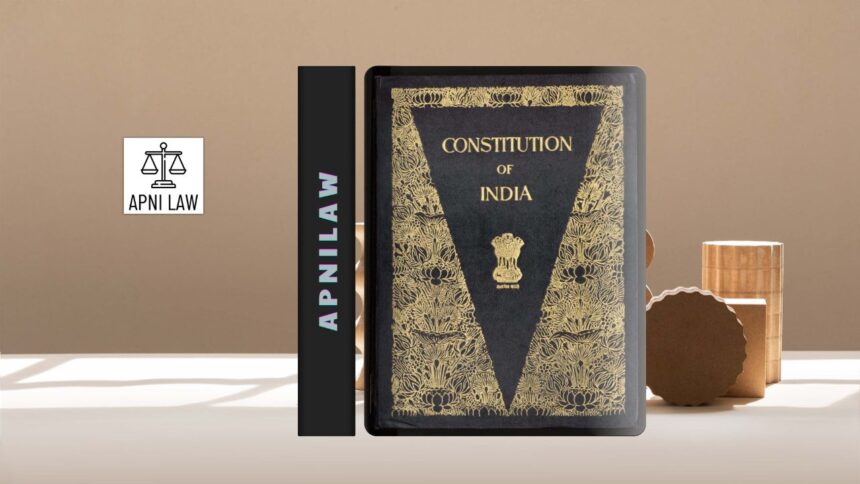Introduction
The Right to Equality under the Indian Constitution protects citizens from discrimination in many areas of life. Among its most important aspects is Article 16, which guarantees equality of opportunity in matters of public employment. This provision ensures that no citizen is denied a chance to serve the State on grounds of religion, race, caste, sex, descent, place of birth, or residence. By doing so, Article 16 affirms the democratic principle that public service must remain open to all, not just to privileged groups.
Article 16 also strikes a balance between formal equality and substantive justice by allowing reservations for disadvantaged communities. Its significance lies not only in preventing discrimination but also in shaping India’s approach to affirmative action in public jobs.
Scope of Article 16
Article 16 applies to employment and appointment under the State. The term “State” includes the central government, state governments, local bodies, and public sector undertakings. This means that any job opportunity created by the government must follow the principle of equality of opportunity.
The provision applies both to initial appointments and promotions, though courts have developed detailed interpretations of its scope. By limiting arbitrary decisions in public employment, Article 16 creates transparency and fairness in the recruitment process.
Equality of Opportunity
The first part of Article 16 guarantees that all citizens shall have equal opportunity in public employment. This principle means that qualifications, merit, and suitability should determine who gets the job. It prevents exclusion or favoritism based on identity.
For example, a government department cannot refuse to hire a person only because of their religion or caste. Instead, the selection must depend on objective criteria like exams, interviews, or performance.
Grounds of Non-Discrimination
Article 16(2) specifically prohibits discrimination on certain grounds. These include religion, race, caste, sex, descent, place of birth, or residence. This list reflects India’s social realities, where such categories have historically shaped privilege and exclusion.
However, Article 16 does not mean the State cannot make any distinctions at all. It allows classifications if they are reasonable and linked to the purpose of public service. For instance, certain posts may require residency in a state to ensure efficient administration. Courts have often upheld such conditions when justified.
Reservations and Special Provisions
One of the most debated aspects of Article 16 is its allowance for reservations. Article 16(4) empowers the State to provide reservations for socially and educationally backward classes, Scheduled Castes, and Scheduled Tribes if they are underrepresented in public employment.
Later amendments expanded this principle. Article 16(4A) allows reservations in promotions for Scheduled Castes and Scheduled Tribes, while Article 16(4B) permits the carry-forward of unfilled reserved vacancies.
These provisions reflect the Constitution’s vision of not just formal equality but also social justice. By correcting historic imbalances, reservations under Article 16 seek to create a more inclusive public service.
Landmark Judgments on Article 16
The Supreme Court has clarified the meaning of Article 16 in several key cases.
In State of Kerala v. N.M. Thomas (1976), the Court held that reservations and relaxations for backward classes were consistent with Article 16, as they aimed to promote substantive equality.
In Indra Sawhney v. Union of India (1992), also known as the Mandal Commission case, the Court upheld 27% reservations for Other Backward Classes. However, it also introduced a 50% ceiling limit on total reservations, except in extraordinary cases.
In M. Nagaraj v. Union of India (2006), the Court ruled that reservations in promotions must meet certain conditions, such as proving backwardness and inadequate representation, while also respecting administrative efficiency.
These judgments show how Article 16 has evolved to balance equality of opportunity with affirmative action.
Practical Impact of Article 16
Article 16 has shaped the structure of public employment in India. Recruitment processes for government jobs rely heavily on merit-based exams and transparent procedures. At the same time, reservation policies ensure representation for marginalized groups.
This dual approach has broadened access to government jobs while also keeping merit at the core of public service. It has also influenced debates on whether economic criteria, such as those applied in the 103rd Constitutional Amendment (2019) for Economically Weaker Sections (EWS), should shape future policies.
Criticism and Challenges
Despite its importance, Article 16 faces criticism. Some argue that excessive reservations dilute merit and create inefficiency in public administration. Others point out that without reservations, historically disadvantaged groups would remain excluded from opportunities.
The challenge lies in balancing merit with social justice. Courts, policymakers, and society continue to debate where this balance should rest.
Contemporary Relevance
In modern India, Article 16 remains vital. Government jobs continue to attract millions of applicants, and the fairness of recruitment is central to public trust. At the same time, demands for reservations by new groups, such as economically weaker sections in forward castes, show that equality of opportunity is still an evolving goal.
As technology transforms recruitment processes and new sectors emerge, the principles of Article 16 will remain essential to ensuring fairness, transparency, and inclusivity.
Frequently Asked Questions
What does Article 16 guarantee?
Article 16 guarantees equal opportunity for all citizens in public employment and prohibits discrimination based on religion, caste, sex, descent, place of birth, or residence.
Does Article 16 allow reservations?
Yes. Article 16(4) and later amendments allow reservations for backward classes, Scheduled Castes, Scheduled Tribes, and under certain conditions, even in promotions.
Why is Article 16 important?
It ensures fairness and inclusivity in government jobs, balancing merit with social justice, and giving disadvantaged groups representation in public service.
Conclusion
Article 16 of the Indian Constitution is a cornerstone of equality in public life. By ensuring fair access to government jobs, it upholds the democratic ideal that public service belongs to every citizen. Its blend of non-discrimination and affirmative action reflects India’s effort to balance merit with social justice.
Through judicial interpretation and legislative changes, Article 16 has adapted to India’s evolving needs. It continues to safeguard fairness in employment, while also reminding us that true equality requires more than identical treatment, it demands inclusiveness, representation, and justice.
For any specific query call at +91 – 8569843472








